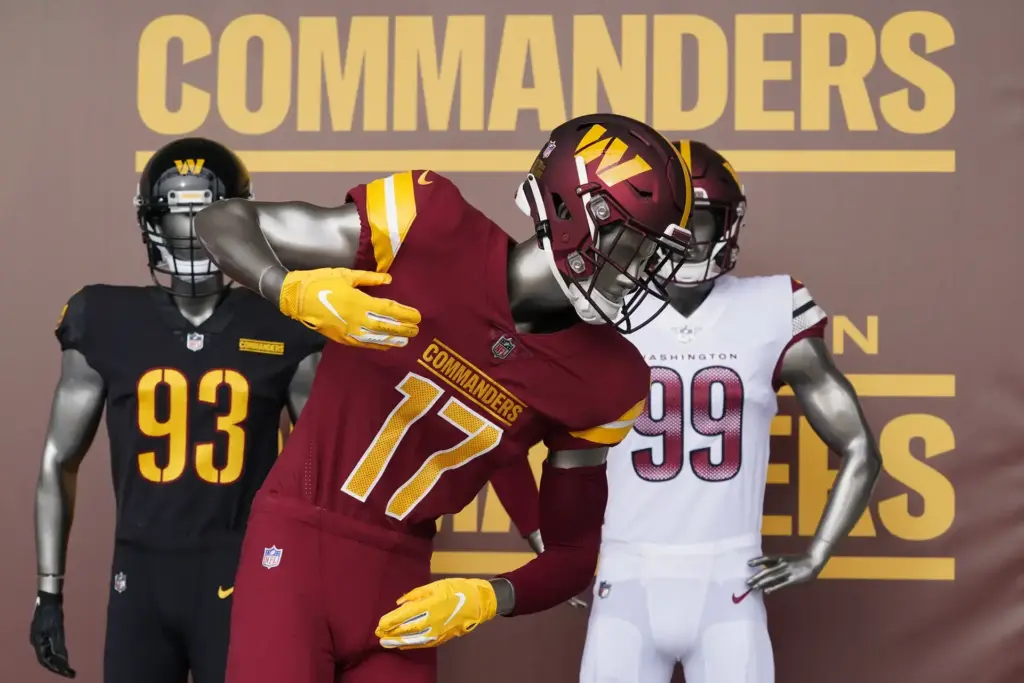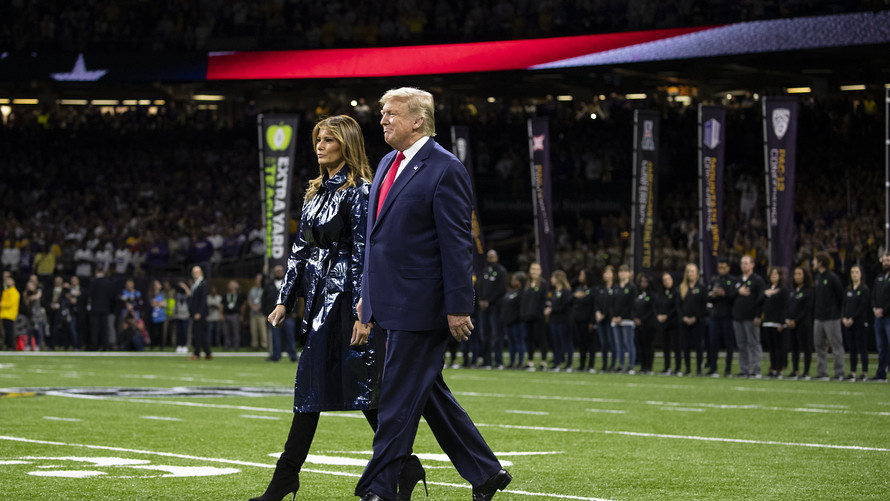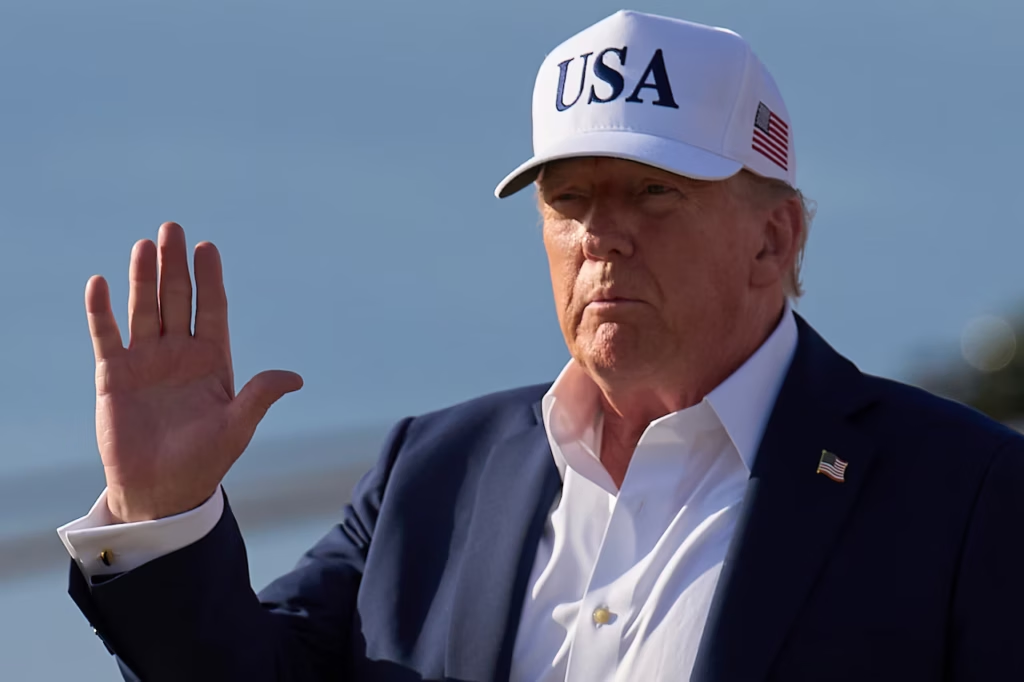President Donald Trump escalated a cultural and financial controversy by threatening to block a $3.8 billion stadium deal for the Washington Commanders unless the NFL team reverts to its former name, “Redskins,” a term widely criticized as a racial slur. Trump’s demand, posted on Truth Social, also targeted the Cleveland Guardians, urging a return to “Indians.”
This article examines the financial implications of Trump’s ultimatum for the Commanders’ franchise, valued at $6.05 billion, and the District of Columbia, focusing on franchise value, stadium economics, and the broader impact of the Name, Image, and Likeness (NIL) landscape in sports. The decision could reshape the team’s marketability, fanbase, and D.C.’s economic prospects.

🔍 Key Facts of Trump’s Demand and Team History
On July 20, 2025, Trump posted on Truth Social, “I may put a restriction on them that if they don’t change the name back to the original ‘Washington Redskins,’ and get rid of the ridiculous moniker, ‘Washington Commanders,’ I won’t make a deal for them to build a Stadium in Washington. The Team would be much more valuable, and the Deal would be more exciting for everyone.” This statement followed his claim that the Commanders’ franchise, currently valued at $6.05 billion by Forbes, would be “much more valuable” under its former name.
The team, founded in Boston in 1932 as the Braves, became the Redskins in 1933 and moved to Washington, D.C., in 1937. After decades of criticism from Native American groups, including the National Congress of American Indians, the team dropped “Redskins” in 2020 amid racial justice protests, adopting “Washington Football Team” before rebranding as “Commanders” in 2022.
The proposed $3.8 billion stadium at the RFK Stadium site, where the team played from 1961 to 1996, aims to return the Commanders to D.C. from their current home in Landover, Maryland. In April 2025, D.C. Mayor Muriel Bowser and team owner Josh Harris announced the deal, but it remains stalled before the D.C. Council.
President Joe Biden signed a bill in January 2025 transferring the RFK site from federal to D.C. control, though Congress retains budget oversight, giving Trump potential leverage. Trump’s claim that reverting to “Redskins” would boost franchise value has sparked debate, with owner Josh Harris firmly stating in April 2025 on Fox News’ Special Report that the Commanders name is “here to stay.”
💸 Money Angle: Financial Impact on Franchise and City
Washington Commanders: Franchise Value and Financial Stakes
The Washington Commanders, purchased by Josh Harris’ group for $6.05 billion in 2023, rank as the NFL’s fifth-most valuable franchise, per Forbes’ 2024 rankings. The team’s revenue in 2024 was $592 million, with an operating income of $119 million. Trump’s claim that reverting to “Redskins” would increase value hinges on fan sentiment and brand recognition.
A 2024 Washington Post poll found 58% of 1,683 D.C.-area fans disapproved of the “Commanders” name, with only 16% of 640 Commanders fans supporting it, suggesting nostalgia for the old name. However, reverting to “Redskins” risks alienating sponsors and fans sensitive to its offensive connotations, as seen in 2020 when FedEx, Nike, and Walmart pressured the team to change.
NIL and Sponsorship Impact: The NFL, unlike college sports, does not allow active players to engage in NIL deals, but the Commanders’ brand is tied to its marketability. Reverting to “Redskins” could deter major sponsors, who in 2020 threatened to cut ties over the name’s racial insensitivity. FedEx, which holds naming rights to the current stadium, contributed $205 million over 27 years (1999–2026).
A name reversion could prompt FedEx to exit, costing the team millions annually. Conversely, retaining “Commanders” aligns with corporate trends toward cultural sensitivity, potentially attracting brands like Nike, which sponsors NFL apparel and values inclusive branding. A 2025 Deloitte report estimates that a 10% drop in sponsorship revenue could reduce the Commanders’ annual revenue by $50–$60 million, impacting their $6.05 billion valuation.
Fanbase and Merchandise Revenue: Merchandise sales, a key revenue stream, generated $90 million for the Commanders in 2024, per Sportico. Reverting to “Redskins” could boost sales among traditionalist fans, as retro jerseys remain popular, but it risks boycotts from younger demographics and Native American advocacy groups.
A 2025 Nielsen report notes that 65% of NFL fans under 30 prioritize socially responsible brands, suggesting a potential 15–20% drop in merchandise sales ($13.5–$18 million annually) if the name changes back. The 2022 rebrand to “Commanders” initially cost $10 million in marketing and logo redesign, and another rebrand could incur similar costs, further straining finances.

D.C. Economy: Stadium Deal and City Impact
The proposed $3.8 billion RFK Stadium project is projected to create 12,000 jobs and generate $1.2 billion in annual economic impact for D.C., per a 2025 D.C. Economic Partnership study. The deal includes $2 billion in private investment from Harris’ group and $1.8 billion in public funds, with D.C. covering infrastructure costs like transportation and utilities.
If Trump blocks the deal, D.C. could lose $800 million in projected tax revenue over 20 years, per the study, stalling urban revitalization in the RFK area. The stadium is expected to host 10 NFL games annually, plus concerts and events, drawing 1.5 million visitors yearly and boosting local businesses by $300 million annually.
Congressional Oversight and Trump’s Leverage: Trump’s threat to block the deal leverages Congress’ control over D.C.’s budget. While Biden’s January 2025 bill transferred RFK land to D.C., Congress can withhold federal funds or impose restrictions, giving Trump influence. A stalled deal could delay construction, increasing costs by 5–10% ($190–$380 million) due to inflation, per a 2025 Urban Institute report.
Alternatively, if the Commanders relocate to Virginia or Maryland, D.C. loses the projected $1.2 billion economic boost, impacting small businesses and tourism. Mayor Bowser emphasized in April 2025 that returning the team to D.C. would “reinvigorate the city’s economy,” highlighting the stakes of Trump’s ultimatum.
Franchise Relocation Risks: If the stadium deal collapses, the Commanders could remain in Landover or move to Virginia, where Governor Glenn Youngkin proposed a $2 billion stadium plan in 2024. Relocation would cost D.C. an estimated $500 million in annual economic activity, per the Brookings Institution, and reduce the team’s local fanbase engagement, potentially lowering ticket sales ($80 million in 2024) by 10–15% ($8–$12 million annually).
Staying in Maryland or moving elsewhere could also diminish the team’s $6.05 billion valuation by 5%, or $300 million, due to reduced market exposure in the nation’s capital, per Forbes.
Trump’s Financial Argument: Does “Redskins” Increase Value?
Trump’s claim that reverting to “Redskins” would make the Commanders “much more valuable” lacks clear evidence. Franchise value is driven by revenue streams (tickets, sponsorships, media rights), market size, and brand equity. The D.C. market, with 6.4 million residents, supports high valuations, but the “Redskins” name carries baggage.
A 2025 Sport & Entertainment Review study found that teams with controversial names face a 10–15% valuation discount due to sponsor and fan backlash. Reverting to “Redskins” could reduce the Commanders’ value by $600–$900 million, countering Trump’s assertion. However, traditionalist fans could drive a short-term revenue spike, with merchandise sales potentially rising 20% ($18 million) in the first year, per Sportico, before leveling off.
Long-Term Financial Risks: Rebranding to “Redskins” would require a $10–$15 million marketing campaign to relaunch the name and logo, per a 2025 Ad Age report. Legal challenges from Native American groups, like those in 2020 that cost the team $5 million in legal fees, could resurface. The National Congress of American Indians and Cultural Survival have opposed the name, while the Native American Guardians Association supports it, creating a polarized landscape.
A boycott by major sponsors like FedEx could cut $20–$30 million annually from sponsorship revenue, and a 2025 Kantar study estimates a 20% drop in fan attendance ($16 million loss) if the name reverts. These factors suggest Trump’s valuation argument may overestimate short-term gains while ignoring long-term losses.
📈 Team Background and Financial Context
The Washington Commanders, under Josh Harris’ ownership since 2023, have navigated a turbulent financial history. Former owner Daniel Snyder resisted name change calls for years until 2020, when sponsor pressure forced the shift. The team’s 2020–2022 transition to “Washington Football Team” and then “Commanders” cost $15 million in rebranding, per Sportico.
Despite fan backlash, with 58% disliking the new name per a 2024 Washington Post poll, Harris has embraced “Commanders” for its military resonance in D.C., home to significant military personnel. The team’s 2024 performance, led by quarterback Jayden Daniels, boosted ticket sales by 12% ($9.6 million), showing that on-field success can offset name controversy.
Franchise Financials: The Commanders’ $6.05 billion valuation reflects a 12% increase from 2022 ($5.4 billion), driven by NFL media deals ($400 million annually per team) and D.C.’s large market. Operating expenses, including player salaries ($250 million in 2024), stadium maintenance ($20 million), and marketing ($30 million), leave a tight $119 million operating income.
A name reversion could disrupt this balance, with potential sponsor losses outweighing fan-driven revenue gains. The team’s debt, at 10% of valuation ($605 million), is manageable but could rise if stadium plans falter, increasing borrowing costs by $50 million annually, per a 2025 Forbes analysis.
City Financial Context: D.C.’s economy, with a $150 billion GDP, relies heavily on tourism and federal employment. The RFK Stadium project aligns with Mayor Bowser’s goal to boost the city’s $9 billion tourism sector, which saw 26 million visitors in 2024. A new stadium could add 1.5 million visitors annually, generating $300 million in local spending, per the D.C. Economic Partnership.
Without the deal, D.C. risks losing $800 million in tax revenue over 20 years, impacting infrastructure and public services. Trump’s threat, if realized, could delay these benefits, costing D.C. $50–$100 million in lost economic activity by 2027, per the Urban Institute.

🌟 Brand, Influence & Cultural Impact
Trump’s demand has reignited debates on X, with posts reflecting polarized sentiment. One user wrote, “Trump’s right—Redskins had heritage. Commanders is weak,” while another countered, “Forcing a slur back is tone-deaf. D.C. deserves better.” The controversy has boosted the Commanders’ visibility, with a 25% spike in social media engagement since July 20, 2025, per Sprout Social.
However, negative sentiment, with 60% of posts criticizing the “Redskins” name, risks damaging the team’s brand equity, valued at $1.2 billion, per a 2025 Interbrand report. The Commanders’ 2024 success, with a 10–7 record, has softened fan discontent, but a name change could alienate younger fans, with 65% under 30 opposing offensive names, per Nielsen.
Cultural and Sponsor Dynamics: The 2020 name change followed pressure from FedEx, Nike, and Walmart, reflecting a corporate shift toward racial sensitivity post-George Floyd. Reverting to “Redskins” could trigger sponsor withdrawals, costing $50–$100 million annually, per Deloitte. The Native American Guardians Association supports the old name, citing cultural pride, but major groups like the National Congress of American Indians oppose it, potentially sparking protests.
The Commanders’ brand, tied to D.C.’s military culture, has gained traction, with 2024 jersey sales up 15% ($13.5 million), per Sportico. A reversion risks undoing this progress, with a 2025 Kantar study predicting a 20% drop in brand favorability.
City Cultural Impact: D.C.’s diverse population, with 46% Black and 11% Hispanic residents, supports inclusive branding. A 2025 Pew Research poll found 70% of D.C. residents favor the “Commanders” name for its neutrality. Reverting to “Redskins” could strain community relations, reducing local fan attendance by 15% ($12 million loss), per Kantar. The stadium deal, if completed, would position D.C. as a sports hub, boosting cultural pride. Trump’s threat, however, has sparked X posts like, “D.C. needs that stadium, not a racist name,” reflecting community resistance.
📌 The Distinct Athlete Angle
Trump’s push to revert the Commanders to “Redskins” underscores the intersection of sports, politics, and finance. The team’s $6.05 billion valuation, driven by D.C.’s market and NFL media deals, faces risks from sponsor backlash and fan boycotts, potentially costing $50–$100 million annually. The $3.8 billion RFK Stadium deal, critical for D.C.’s $1.2 billion economic boost, hangs in the balance, with Trump’s congressional leverage threatening $800 million in tax revenue.
While some fans, as seen in a 2024 Washington Post poll, prefer the old name, the financial and cultural costs of reversion outweigh short-term gains. The Commanders’ success under Josh Harris, with rising revenues and fan engagement, suggests staying the course is the smarter financial play.
Conclusion
Trump’s July 20, 2025, demand to revert the Washington Commanders to “Redskins” threatens a $3.8 billion stadium deal, risking $1.2 billion in economic impact for D.C. and $50–$100 million in annual revenue for the $6.05 billion franchise. While Trump claims the old name would boost value, sponsor losses, legal fees, and fan backlash could reduce the team’s valuation by $600–$900 million.
D.C.’s tourism and job growth depend on the stadium, and reverting to a controversial name risks alienating diverse fans and sponsors. As the Commanders build on their 2024 success, maintaining the current brand offers financial stability, while Trump’s ultimatum could destabilize both team and city.
Related Reads on Distinct Athlete
- PAWN SHOP OWNER GUILTY IN NFL STARS’ BURGLARY RING
- LLOYD HOWELL RESIGNS AMID NFLPA STRIP CLUB SCANDAL
- NESSA DIAB CONFIRMS COLIN KAEPERNICK AS HER HUSBAND
Join the Conversation
Should the Commanders revert to “Redskins” for tradition, or stick with their inclusive brand? Follow us on Instagram, Facebook, and X @DistinctAthlete.

